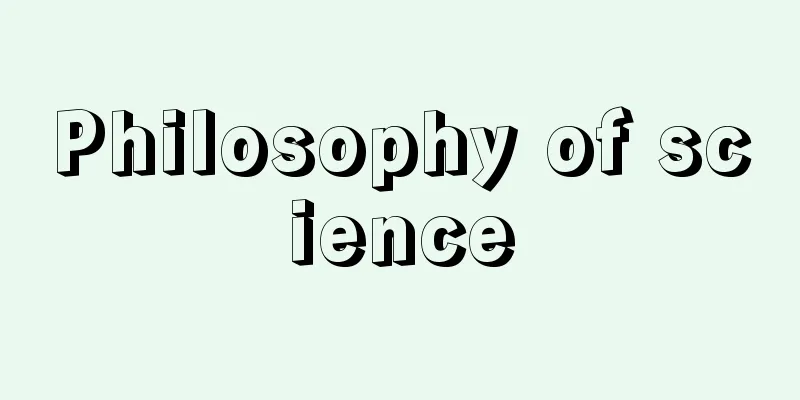Philosophy of science

|
It means philosophical consideration of science. In general, the word "philosophical" is ambiguous, and the term "philosophy of science" is also ambiguous. However, in a broad sense, it means the intellectual endeavor of (1) objectively observing, analyzing, and describing what is called science or the activities of scientists, (2) proposing the methods that science should take, and (3) seeking the ideal form of science. Among (1), the part that objectively observes, analyzes, and describes what is called science is also called "meta-science," and its main task is basically the logical and descriptive analysis of the concepts, laws, and theories used in science, as well as the mathematics and logic used therein. This part is, so to speak, the elucidation of the essence of science, and is the core of the philosophy of science. In contrast, the part that objectively observes, analyzes, and describes the activities of scientists is mainly the logical and descriptive analysis of how scientists conceive, construct, develop, verify or disprove science, and furthermore, how they use science to explain and predict phenomena and laws. (2) is the field known as "methodology of science," and its main task is to propose methods for constructing and developing science. If we take science broadly as objective knowledge, this field has a long history dating back to Aristotle, and particularly famous methods include J.S. Mill's "method of induction," logical positivism's "hypothetico-deductive method," Popper's "falsificationism," and the "counter-induction" of Kuhn and PK Feyerabend (1924-1994). (3) seeks to reexamine science within the context of human history and to seek what it should be for the happiness of humanity; much of what is called the “theory of science” is related to this. Thus, the philosophy of science can be said to be an intellectual endeavor to step back from science itself, to look at science or the activities of scientists objectively, and to seek the actual and ideal forms of science. However, in fact, this philosophy of science has another aim. That is to recognize the limitations of science, and thereby to dispel misunderstandings about science. It is a misunderstanding to think that science is a solid academic system that can deal with any phenomenon. Science is not so omnipotent, nor is it solid. It is also a misunderstanding to think that the world view that science gives us is the true form of the objective world. We should keep in mind that science is the result of research based on a certain method known as the scientific method, and that many parts are discarded by it. The philosophy of science, which teaches us these things, is therefore extremely meaningful not only to scientists, but also to us in general today. [Hiroshi Kurosaki] "The Philosophy of Natural Science" by Karl G. Hempel, translated by Hiroshi Kurosaki (1967, Baifukan) " "The Dynamics of Science" by Yoichiro Murakami (1980, Science Press) Source: Shogakukan Encyclopedia Nipponica About Encyclopedia Nipponica Information | Legend |
|
科学についての哲学的考察を意味する。一般に、「哲学的」という語は多義的であり、それに応じて「科学哲学」という語も多義的になる。しかしそれは広義には、(1)科学といわれるもの、あるいは科学者の営みを客観的に観察し、分析し、記述し、(2)科学がとるべき方法を提案し、(3)科学のあるべき姿を求める、といった知的努力を意味する。 (1)のうち、とくに科学といわれるものを客観的に観察し、分析し、記述する部分は、「メタ科学」meta-scienceともいわれ、基本的には、科学で用いられている概念、法則、理論、およびそこで使われている数学や論理学についての、論理的・記述的分析が、そのおもな仕事となる。この部分は、いわば科学の本体の解明であり、科学哲学の中心をなす。これに対し、科学者の営みを客観的に観察し、分析し、記述する部分は、科学者が科学を発想し、構成し、展開し、検証ないし反証し、さらには、科学を用いて事象や法則を説明し、予測する営みについての、論理的・記述的分析が、そのおもな仕事となる。 (2)は、いわゆる「科学方法論」methodology of scienceといわれる分野であり、とくに、科学を構成し展開していくためにとるべき方法を提案することが、そのおもな仕事である。科学といわれるものを広く客観的知識ととるならば、この分野には、アリストテレスの昔からの連綿とした歴史があり、とくに有名なのは、J・S・ミルの「帰納法」、論理実証主義の「仮説演繹(えんえき)法」、ポパーの「反証主義」、クーンやファイヤアーベントP. K. Feyerabend(1924―1994)らによる「反帰納法」などである。 (3)は、科学を人類史の流れのなかに置いて見直し、人類の幸福のためにそのあるべき姿を求めようとするものであり、「科学論」といわれるものの多くは、これにかかわっている。 したがって科学哲学とは、結局、科学自体から一歩離れて、科学ないし科学者の営みを客観的に眺め、それらの現実の姿およびあるべき姿を求める知的努力である、といえよう。しかし、実は、このような科学哲学には別のねらいもある。それは、科学の限界を自覚し、それによって、科学にまつわる誤解を解くことである。科学というものを、いかなる事象をも取り扱える一つの確固とした学問体系である、とみなすことは誤解である。科学は、それほど万能ではなく、また確固としてもいない。また、科学が与える世界像こそ客観的世界の真の姿である、と考えるのも誤解である。科学は、科学的方法といわれる一定の方法に基づいた探究の結果であって、それによって切り捨てられた部分も多いことを、肝に銘じておくべきである。これらのことを教えてくれる科学哲学は、それゆえ、科学者に対してのみならず、今日のわれわれ一般にとっても、きわめて大きな意味がある。 [黒崎 宏] 『カール・G・ヘンペル著、黒崎宏訳『自然科学の哲学』(1967・培風館)』▽『村上陽一郎著『科学のダイナミックス』(1980・サイエンス社)』 出典 小学館 日本大百科全書(ニッポニカ)日本大百科全書(ニッポニカ)について 情報 | 凡例 |
>>: Chemical oxygen demand - Chemical oxygen demand
Recommend
Appalachian Trail
In addition, the Kyushu Nature Trail (2,587 km) w...
Dirty Harry
An American film produced in 1971. Original title:...
Utagawa Yoshitora
Year of birth: Year of birth and death unknown. Uk...
Sheep science - Kuyogaku
It refers to the hermeneutics of "Gongyang Z...
Huntsville - Hantsubir (English spelling) Huntsville
Madison County is the county seat of Madison Coun...
Katsumoto Hosokawa
Year of death: Bunmei 5.5.11 (1473.6.6) Year of bi...
Zhao Yi - Very well
A Chinese scholar and poet during the Qianlong pe...
special visual effects
…Special photographic effects (or special visual ...
Glass Condenser
...There are disk or cylindrical ceramic capacito...
Taxpayer Identification Number System
A system in which all taxpayers are given a unique...
globigerina ooze (English spelling) globigerina ooze
...An example of chemical composition is shown in...
Augsburg Confession - Augsburg Confession (English spelling) Confessio Augustana [Latin]
Drafted by Luther's collaborator Melanchthon a...
Tea house
A facility exclusively used for tea ceremonies. D...
achromat
...A lens with chromatic aberration corrected. It...
Capital - Shihon (English spelling) capital English
In everyday terms, it refers to production and sa...









